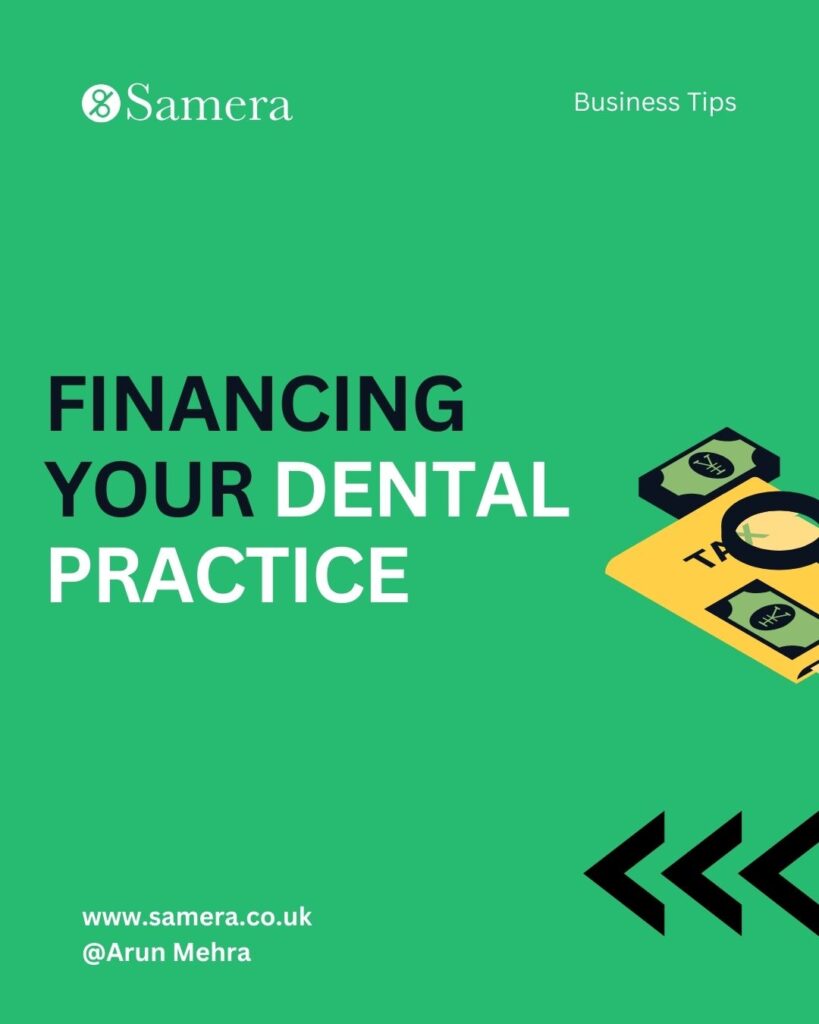
It is still a surprise to me that many borrowers are not aware of how much they can raise when seeking finance for a project.
In most cases, potential borrowers underestimate what they can raise and, therefore, what they can purchase.
When looking at buying a dental practice, the amount you can borrow is often linked to several things and lenders (Banks) all have different policies, limits and requirements.

Who am I dealing with when I borrow finance?
It is very important to ensure that you are dealing with a lender who has experience and knowledge of the dental market. Many bankers are “generalists” and deal with many types of businesses.
Several lenders have set up specialist healthcare teams, staffed with knowledgeable staff who can assess your application in the correct way.
These specialist teams are rarely located in local branches and their experience (as you would expect) varies with how long they have been with the team.
Action Point
When seeking finance for a project, borrowers often underestimate their borrowing potential. It’s crucial to work with lenders experienced in the dental market, as they can accurately assess your application. Specialist healthcare teams within certain lenders can provide valuable insights and tailored financing solutions for dental practice acquisitions.
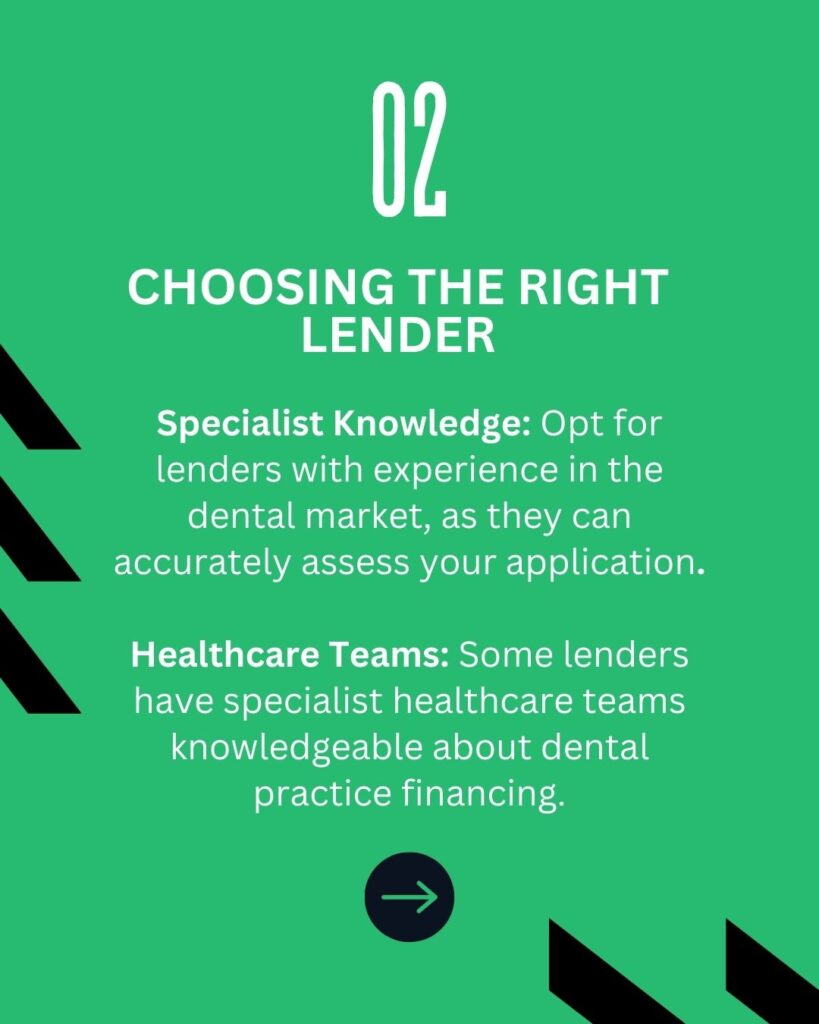
Click here to read more about finance options for dentists.
What determines what I can borrow?
Bank Policy determines this, and this can vary as to:
- Lending an amount per dentist for each transaction
- Lending a percentage of the goodwill valuation
- Lending a percentage of the goodwill valuation plus lending against security
- Sometimes lenders vary the amount they will lend according to where you are in the UK
- Your professional experience – lenders require between 3 and 5 years minimum in a practice
- Some borrowers restrict the term of the loan to 10 years, others to 15 years
- If you are setting up a squat (start-up) then 70% finance may be available
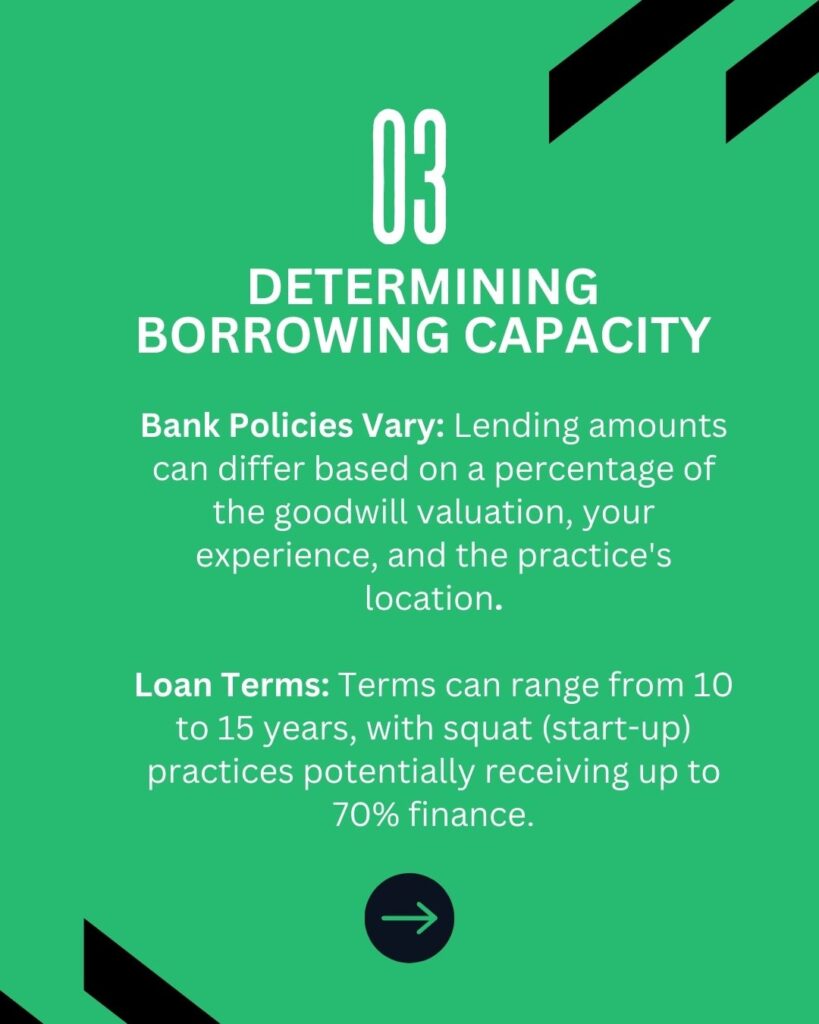
Click here to read more about how banks assess you when you apply for finance.
What does this mean in terms of how much I can raise?
If you take a figure of 70% -80% as a guide for purchasing an NHS or private practice, this will give you a good idea of what can be achieved.
However, loans can be available for up to 95% with security.
Before everyone goes off to look at that £1,000,000 practice, there are some basics to remember.

Contact us to find out more
Loans must be affordable. The EBITDA of a business (Earnings before interest, tax, depreciation and amortisation) will demonstrate whether a business can afford to support a borrowing. You will need to have cash available for a deposit, solicitor’s costs and fees that lenders charge.
You may need to look at how the business will perform in the future with you as the owner. Will you keep on the seller and the existing associates? What new services will you introduce? What will you change?
Lenders may require projections as evidence of how you intend to grow the value of the business.
Action Point
Your borrowing capacity is determined by various factors outlined in bank policies, such as lending amount per dentist, percentage of goodwill valuation, professional experience, and location. Typically, loans can range from 70% to 80% of the practice’s value, with up to 95% available with security. However, affordability is paramount, considering the business’s EBITDA and your ability to cover costs like deposits and fees. Lenders may also require projections demonstrating how you plan to enhance the business’s value under your ownership.

Click here to watch our webinar on financing your first practice.
You could contact your own bank and see if they can assist. However, considering all the differences would that be the right structure and cost for you?
Could you get a better deal elsewhere? Remember this is going to be for 15 years!
With all the differences in pricing, fees, loan terms, commitment periods and early repayment penalties it is best to shop around.
Click here to read our blog on How to finance a healthcare business.
So why use a broker?
As brokers, we are independent. We are not tied to any lender and will look at the market for you, we act solely for you.
We will assess your own situation as an individual case, we will approach several lenders who we believe can help you, using our own experience and knowledge of the industry.
We will obtain offers of finance for you from several sources so that you can compare the offers and decide which is best for you and your business.
We will negotiate on your behalf to get the best price for you and liaise with the lender through the process of due diligence, valuation, taking of security and any other requirements they may have.
You will have us by your side throughout the process, utilising 200 years of banking experience across the team and the knowledge of us having completed so many deals in that time.
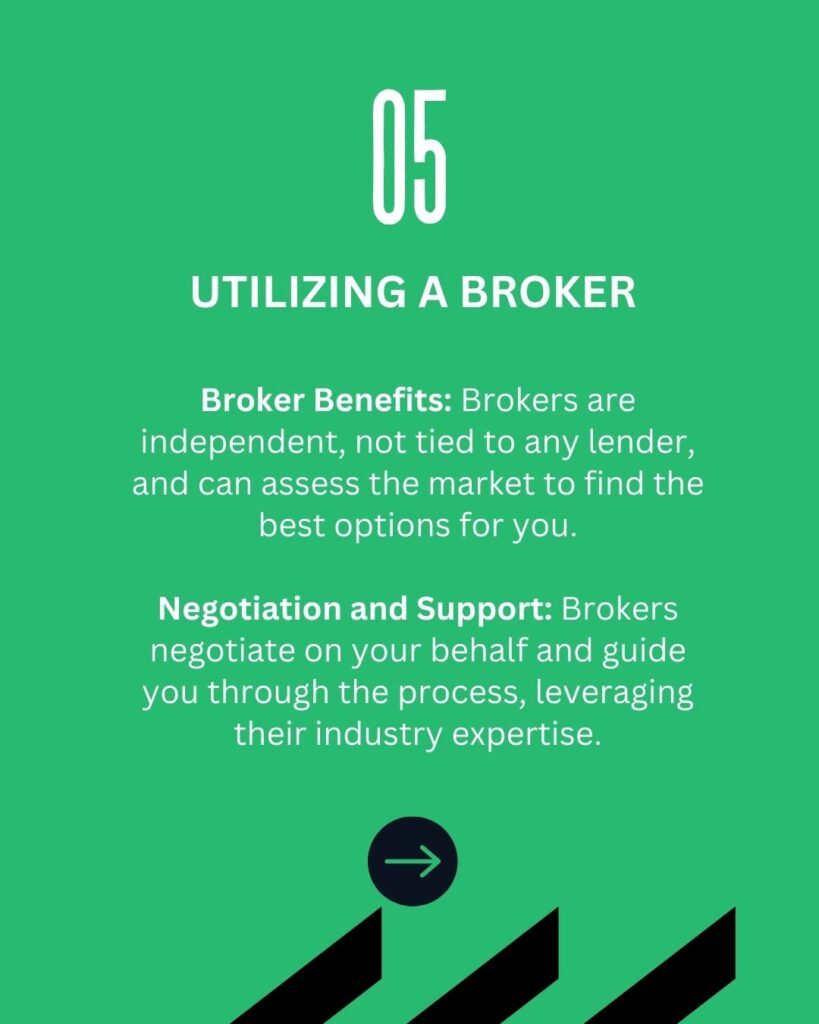
Action Points
- Independence: Brokers are not tied to any specific lender, allowing them to impartially assess the market and find the best fit for your needs.
- Personalized approach: Brokers evaluate your unique situation and approach multiple lenders they believe can offer suitable solutions based on their industry expertise.
- Access to multiple offers: Brokers obtain finance offers from various sources, enabling you to compare terms and select the most favorable option for your business.
- Negotiation support: Brokers advocate on your behalf, negotiating with lenders to secure competitive pricing and favorable terms.
- Expert guidance: With years of banking experience and numerous deals completed, brokers provide invaluable support and guidance throughout the entire process.
We will make sure that you see what is available across the market.
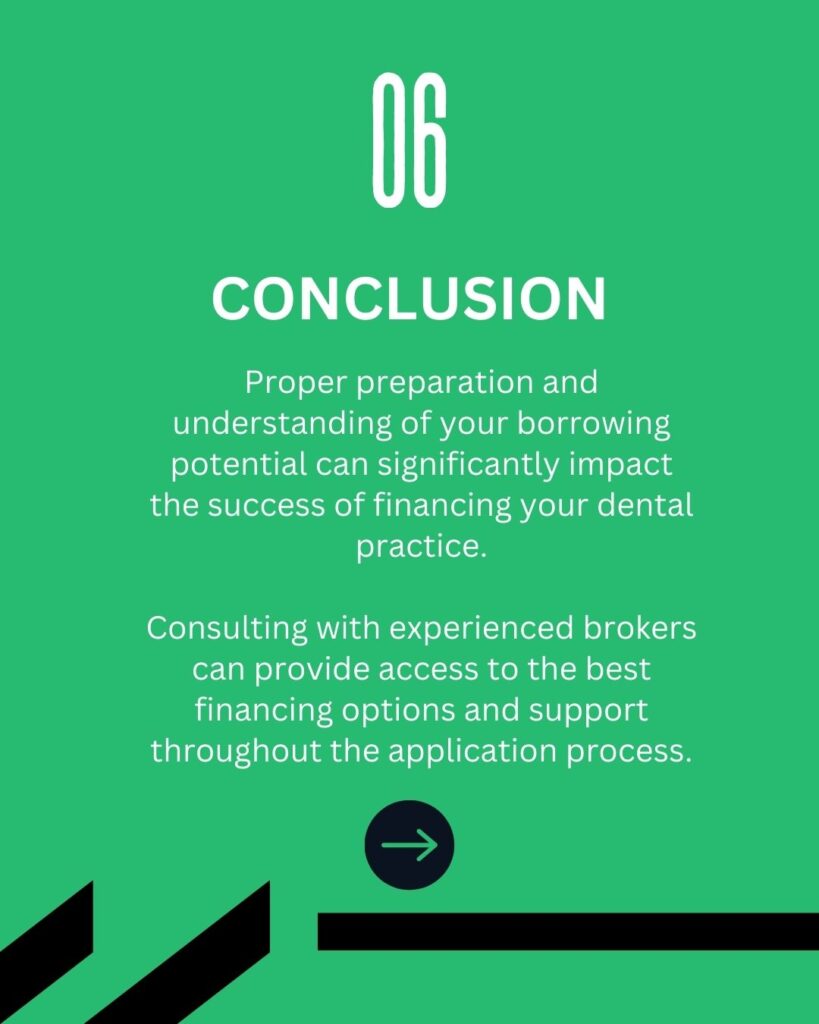
Click here to read 5 reasons to use a commercial finance broker.
How much can I raise frequently asked questions
How much capital can I raise for my dental practice?
The amount of capital you can raise for your dental practice depends on several factors, including the practice’s profitability, creditworthiness, and the type of financing sought. Lenders typically consider your financial history, loan-to-value ratios, and the purpose of the funding, whether it’s for expansion, purchasing equipment, or acquiring a practice. With proper financial projections and a solid business plan, dental practices can secure significant funding through loans, equity, or other financing options.
What factors affect the amount of funding I can raise for my practice?
The amount of funding you can raise for your dental practice is influenced by factors such as the practice’s profitability, cash flow, and financial stability. Lenders also consider your credit history, the loan-to-value ratio, and the purpose of the funding, whether it’s for expansion, acquiring new equipment, or purchasing a practice. A strong business plan, solid financial projections, and collateral can further improve your chances of securing a higher amount of capital.
What types of financing options are available for dental practices?
Dental practices can explore several financing options, including:
- Traditional Bank Loans: For equipment purchases or practice expansion.
- Small Business Loans: Government-backed loans offering favorable terms.
- Equipment Financing: Specifically for purchasing dental machinery.
- Private Investors: Equity-based funding from investors.
- Lines of Credit: Flexible funding for ongoing operational costs.
Each option offers varying interest rates, repayment terms, and eligibility criteria, depending on the practice’s financial health and funding needs
Can I raise capital to expand my dental practice?
Yes, you can raise capital to expand your dental practice through various financing options. These include traditional bank loans, small business loans, and private investors. Lenders typically evaluate your practice’s financial health, profitability, and growth potential when determining the amount of capital you can raise. Expanding into new locations, upgrading equipment, or increasing services are common reasons for seeking expansion funding.
How do lenders assess dental practice loan applications?
Lenders assess dental practice loan applications by evaluating several key factors, including the financial health of the practice, its profitability, and cash flow. They also consider the applicant’s credit history, collateral, and business plan. Lenders look at the purpose of the loan (e.g., for expansion, equipment, or practice acquisition) and assess whether the practice has a solid growth potential. Strong financial projections and past performance improve the chances of securing a loan.
How does practice profitability influence the capital I can raise?
Practice profitability plays a crucial role in the amount of capital you can raise. Lenders and investors assess profitability to determine the financial stability and growth potential of the practice. Higher profitability indicates lower risk, which can result in better loan terms, higher loan amounts, or more favorable interest rates. A profitable practice also demonstrates strong cash flow, making it more attractive to lenders when seeking funds for expansion, equipment purchases, or other needs.
Can I raise funds to buy an existing dental practice?
Yes, you can raise funds to buy an existing dental practice. Financing options include traditional bank loans, small business loans, and specialized healthcare financing. Lenders will evaluate the practice’s current profitability, assets, and cash flow, as well as your personal credit history and business plan. The purchase price and projected return on investment are key factors in determining the loan amount and terms.
What is the loan-to-value ratio for dental practice loans?
The loan-to-value (LTV) ratio for dental practice loans typically ranges from 70% to 85%, depending on the lender and the specific financial situation of the borrower. This means lenders may provide loans covering up to 85% of the practice’s value, while the buyer is expected to contribute the remaining percentage as a down payment. A higher LTV ratio may require stronger creditworthiness or financial guarantees to secure favorable terms.
What documents are needed to secure dental practice funding?
To secure dental practice funding, you’ll typically need the following documents:
- Business plan: Detailing the purpose of the loan and projected financial growth.
- Financial statements: Recent profit and loss statements, balance sheets, and cash flow reports.
- Tax returns: Both personal and business tax returns for the last 2-3 years.
- Practice valuation: If purchasing or expanding a practice.
- Credit report: Personal and business credit history.
- Legal documents: Any relevant agreements or licenses.
How does my credit history impact my ability to raise capital?
Your credit history significantly impacts your ability to raise capital, as lenders use it to assess your financial reliability. A strong credit score demonstrates responsible debt management and reduces the risk for lenders, leading to better loan terms and higher borrowing limits. Poor credit history, on the other hand, may result in loan rejections, higher interest rates, or the need for additional collateral. Improving your credit score before applying can enhance your chances of securing funding.
Are there government loans for dental practices?
Yes, there are government-backed loans available for dental practices, such as those offered through the British Business Bank and other small business loan schemes. These loans often come with favorable terms, lower interest rates, and extended repayment periods, making them an attractive option for financing. Programs like the Startup Loan Scheme and the Coronavirus Business Interruption Loan Scheme (CBILS) also provide funding opportunities for healthcare businesses, including dental practices.
What role do financial projections play in raising capital?
Financial projections play a crucial role in raising capital by providing lenders or investors with a clear picture of your dental practice’s future revenue, profitability, and cash flow. Accurate projections demonstrate your ability to repay loans, manage expenses, and achieve growth. They help assess the financial viability of the practice and can influence the loan amount and terms. Strong financial forecasts increase investor confidence and improve your chances of securing the necessary funding.
What are typical interest rates for dental practice loans?
Typical interest rates for dental practice loans can vary based on factors like the lender, the borrower’s creditworthiness, loan term, and the amount borrowed. Rates typically range from 4% to 12%, with lower rates for highly qualified borrowers or government-backed loans. Secured loans generally offer better rates, while unsecured loans may come with higher interest. It’s essential to compare lenders and loan options to secure the most favorable terms for your dental practice.
Can I use personal savings to fund my dental practice?
Yes, you can use personal savings to fund your dental practice. This is a common method for many business owners looking to avoid debt or interest payments. Using personal savings offers full control over the practice without needing to rely on outside lenders or investors. However, it’s important to assess your financial situation carefully, ensuring that tapping into your savings won’t impact your personal financial security. It may also be helpful to combine personal savings with external funding sources for flexibility.
What strategies can improve my chances of securing a loan?
To improve your chances of securing a loan for your dental practice:
- Prepare a strong business plan detailing your growth strategy and loan purpose.
- Maintain a good credit score by managing personal and business debt responsibly.
- Ensure accurate financial records including profit, cash flow, and tax returns.
- Offer collateral or a down payment to reduce risk for lenders.
- Show profitability and positive cash flow to prove the practice’s financial stability.
How much equity can I raise for a dental practice?
The amount of equity you can raise for a dental practice depends on the value of the practice and the percentage of ownership you’re willing to sell to investors. Typically, practices with strong profitability and growth potential can attract higher equity investment. Valuations will factor in assets, revenue, patient base, and market conditions. Engaging with investors or private equity firms specialized in healthcare can maximize the amount of equity you raise.
How does practice size affect the amount of funding available?
The size of your dental practice affects the amount of funding available by influencing profitability, cash flow, and overall financial stability. Larger practices with higher revenues and established patient bases are typically seen as lower risk by lenders, making it easier to secure larger loans or investments. Smaller practices may need to provide more robust financial projections and demonstrate strong growth potential to secure similar funding levels. Practice size also impacts the amount of collateral and equity available for securing loans.
Can private investors fund my dental practice?
Yes, private investors can fund your dental practice by providing equity or debt financing. In exchange for equity, investors may take ownership shares, while in debt financing, they provide loans with agreed repayment terms. Attracting private investors often requires a solid business plan and a proven track record of profitability or growth potential. Private investors can offer more flexible terms than traditional lenders and may also provide strategic support to help grow the practice.
What risks should I consider when raising capital?
When raising capital for your dental practice, consider risks such as:
Debt burden: High loan amounts can strain cash flow if revenues fall short.
Dilution of ownership: In equity financing, selling shares may reduce your control over the practice.
Interest rates: Loans with high-interest rates increase long-term costs.
Repayment terms: Inflexible terms can lead to financial strain during slower periods.
Risk to personal assets: Collateral-backed loans could put your personal assets at risk if the practice underperforms.
What common mistakes should I avoid when seeking funding for my dental practice?
When seeking funding for your dental practice, avoid common mistakes such as:
Failing to prepare a detailed business plan.
Not understanding the terms of loans or equity agreements.
Overestimating revenue and underestimating expenses.
Relying on a single funding source.
Ignoring cash flow management post-funding.
Taking on too much debt strains the practice.
Not considering the impact on ownership and control when seeking investors.
About the Author

Arun Mehra
With almost twenty years of commercial experience and knowledge in Dentistry, Arun’s expertise is valued by hundreds of businesses across the UK. His financial acumen and know-how, along with his hands-on commercial expertise have helped clients, large and small, new and established to achieve great things.
Arun is the founder of the Samera Group, starting the business with just one client sitting at his father’s dining table. Fifteen years on, Team Samera now service hundreds of Dental clients, run exciting events, help clients raise finance, and are very active in helping clients buy or sell Dental practices.
Business Loans for Healthcare Businesses
We’ve been helping to fund the future of British healthcare businesses for over 20 years and our team are made up of former bankers with decades of experience in the UK’s healthcare lending sector.
You can find out more about working with Samera and the financial services we offer by booking a free consultation with one of the Samera team at a time that suits you (including evenings) or by reading more about our financial services at the links below.
For more information on raising finance for your healthcare business, including more articles, videos and webinars check out our Learning Centre here, full of articles and webinars like our How to Guide on Financing a Dental Practice.
Make sure you never miss any of our articles, webinars, videos or events by following us on Facebook, LinkedIn, YouTube and Instagram.



